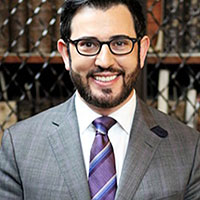Reflecting on 70 years of human rights in public health
December 10, 2018
While we celebrate the enduring legacies of human rights, we must also strive to identify, and to rectify, the constraints on rights-based governance for public health in a globalizing world. It is more important than ever for the health and human rights communities to stand together as partners to uphold the values of the Universal Declaration of Human Rights and resist contemporary threats to human rights.
—Benjamin Mason Meier
Today marks the 70th anniversary of the Universal Declaration of Human Rights.
An annual global celebration recognizes Human Rights Day, commemorating the anniversary of the December 10, 1948, adoption of the Universal Declaration of Human Rights by the United Nations General Assembly. Groundbreaking in its proclamation of “a common standard of achievement for all peoples and all nations,” this Declaration asserted the inalienable rights to which everyone is entitled as a human being — regardless of race, color, religion, sex, language, political or other opinions, national or social origin, property, birth or any other status. It is the most translated document in the world, available in more than 500 languages.

Dr. Benjamin Mason Meier
To address this milestone anniversary, UNC-Chapel Hill professor Benjamin Mason Meier, JD, LLM, PhD, the Zachary Taylor Smith Distinguished Chair in Public Policy and adjunct associate professor of global health policy with the Gillings School of Global Public Health, has worked over the past year to develop several landmark statements on the past, present and future of human rights in public health.
In an article published Dec. 9 by The Lancet, co-authored with the World Health Organization’s director-general, Tedros A. Ghebreyesus, PhD, Meier traced the evolution of the right to health in “Seventy Years of Human Rights in Global Health: Drawing on a Contentious Past to Secure a Hopeful Future.”
Rising out of his leadership as the founding chair of the American Public Health Association’s Human Rights Forum, Meier additionally published a Dec. 4 perspective in the Health and Human Rights Journal on “Human Rights in Public Health: Deepening Engagement at a Critical Time,” outlining ways in which human rights can be mainstreamed in public health practice.

Meier’s work at the forefront of the field has been driven by his 2018 volume on human rights in global health governance with Oxford University Press, Human Rights in Global Health: Rights-Based Governance for a Globalizing World. This book united contributions from 48 scholars and policymakers throughout the world to examine an expansive set of international organizations that employ human rights in responding to public health challenges in a rapidly globalizing world. In a video introduction to this volume, Meier and co-editor Lawrence O. Gostin, JD, University Professor at Georgetown University, describe the importance of human rights to global health and the implementation of human rights through global governance.
“The Universal Declaration of Human Rights was the birth of human rights under international law as a basis for public health,” Meier shared. “The Declaration remains crucial in providing a universal framework for advancing global health with justice.”
Now, as then, human rights matter for public health.
Describing his work with the World Health Organization, Meier noted that “at a moment when nations are turning away from human rights, WHO has sought to bring human rights back to the center of global health governance. As Dr. Tedros has assumed the role of WHO director-general in the past year, he has advanced the right to health as a normative foundation and political catalyst in his efforts to realize universal health coverage, and it has been inspiring to support WHO to realize this vision of human rights in global health.”
“There is, however, a need to look beyond WHO,” he added. “Human rights are implemented in global health through a dynamic global governance system — extending across WHO’s mandate to realize the right to health; UN specialized agency efforts to address a range of health-related human rights; economic governance to support rights-based priorities in public health funding; and human rights governance to advance global health.”
“I hope that today’s celebration of Human Rights Day will provide an opportunity for the public health community to reflect on the 70-year evolution of human rights and to consider the political engagement that will be necessary to secure the future of human rights in public health.”
In 2017, Meier received the Outstanding Recent Alumnus Award from Columbia University’s Mailman School of Public Health. In 2018, he was chosen to receive the American Public Health Association’s Early Career Award for Excellence in Public Health Law.
Dean Barbara K. Rimer of the UNC Gillings School wrote a recent blog post in recognition of Human Rights Day 2018, in which she discussed other aspects of Meier’s extensive body of work.
Contact the Gillings School of Global Public Health communications team at sphcomm@listserv.unc.edu.
